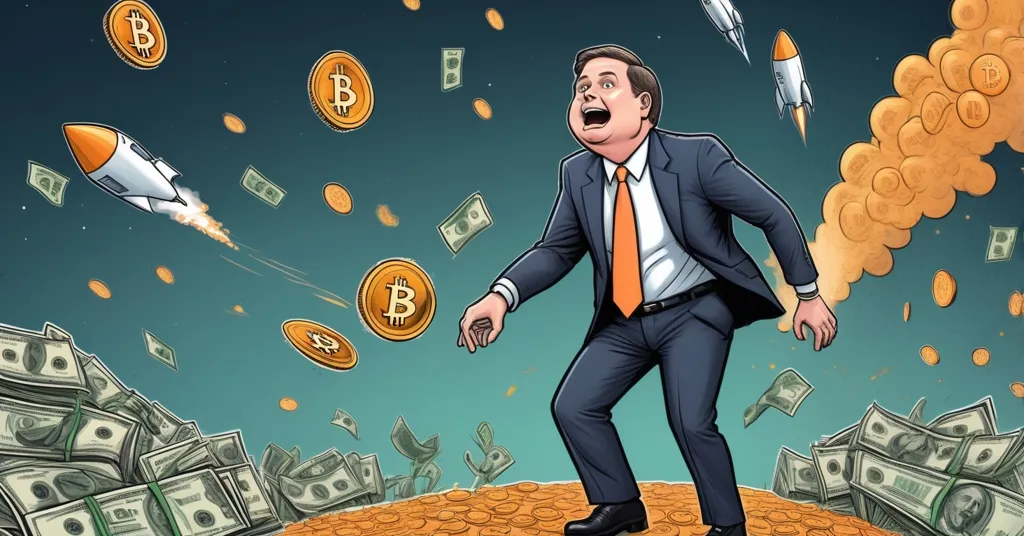German Government’s $2.3B Bitcoin Blunder: Sold Too Soon as Price Soared Past $106K

How German Government Missed Out On $2.3 Billion By Selling Its Bitcoin Stash Too Early
In the summer of 2024, the German government sold its entire Bitcoin stash, a decision that cost them a potential $2.35 billion in profits as the cryptocurrency’s price soared past $106,000. The sale of 49,858 Bitcoins at an average price of $57,900 per coin was influenced by the need to liquidate assets seized from the defunct Movie2k website. Meanwhile, the U.S. government has also missed out on significant gains by selling Bitcoin too early, with a potential opportunity cost of $20.3 billion. Recent policy shifts in the U.S. under President Trump and legislative efforts by Senator Cynthia Lummis suggest a different approach to Bitcoin holdings in the future.
- German government sold 49,858 Bitcoins at $57,900 each
- Missed opportunity of $2.35 billion as Bitcoin price hit $106,306
- U.S. government missed out on $20.3 billion in potential profits
- New U.S. policies suggest a shift towards holding Bitcoin
The German Bitcoin Sale
The German government’s Bitcoin holdings originated from the now-defunct Movie2k, a notorious film piracy website. In an effort to liquidate these seized assets, they sold 49,858 Bitcoins at an average price of $57,900 per coin, generating over $2.89 billion. However, as the crypto market rebounded, Bitcoin’s price surged past $106,000, leaving Germany with an opportunity cost of $2.35 billion in unrealized gains. Unrealized gains are profits that could have been made if the asset was not sold prematurely.
Blockchain intelligence firm Arkham Intelligence, a company that analyzes data on the blockchain, highlighted the financial blunder on X, stating:
If they had held it, their BTC would now be worth $5.24B. Opportunity cost: $2.35 Billion.
This sharp analysis underscores the potential value of holding onto Bitcoin as a long-term investment rather than rushing to liquidate. The German government’s haste to sell its Bitcoin stash across multiple exchanges might have contributed to a broader market downtrend, according to reports. It’s a reminder that in the volatile world of cryptocurrencies, timing is everything, and hasty decisions can lead to missed opportunities. Yet, one could argue that the government’s urgency to liquidate might have been driven by regulatory pressures or immediate budget needs, highlighting the delicate balance between seizing opportunities and managing risks.
U.S. Bitcoin Strategies
Similarly, the U.S. government has been selling Bitcoin seized from various sources over the last decade. According to Jameson Lopp, Case CSO who tracks U.S. government Bitcoin sales, the U.S. sold 195,091.75 Bitcoins, earning $366.5 million but missing out on a potential $20.3 billion in profits. This historical approach reflects a reactive stance towards digital assets.
However, recent developments suggest a shift in U.S. policy. President Trump signed an Executive Order (a directive from the President that has the force of law) in March to establish a Strategic Bitcoin Reserve, which could be thought of as a special storage of Bitcoins to use as needed. This move signals a potential change in how the government views and manages its Bitcoin holdings. Furthermore, Wyoming Republican Senator Cynthia Lummis reintroduced the BITCOIN Act, which could allow the U.S. to hold over 1 million Bitcoins in its reserves. These actions indicate a growing recognition of Bitcoin’s long-term value and potential as a national asset, aligning with the ethos of decentralization and effective accelerationism.
Market Impact and Lessons Learned
The German government’s rushed sale of its Bitcoin stash may have contributed more to Bitcoin’s downtrend than the volume of Bitcoin sold, according to reports. This adds a layer of complexity to the narrative, suggesting that the sale’s timing and execution had broader market implications. It’s a stark reminder that in the world of crypto, where massive gains are always on the horizon, timing and strategy are crucial. Governments must navigate the fine line between seizing opportunities and mitigating risks.
The missed profits by both Germany and the U.S. underscore the importance of a strategic approach to managing digital assets. The establishment of a Strategic Bitcoin Reserve in the U.S. could serve as a hedge against economic uncertainties, positioning the country as a leader in the next era of digital finance. It’s a move that champions decentralization and freedom, disrupting the status quo and embracing the potential of effective accelerationism.
The Future of Government-Held Bitcoins
The upcoming auction of $6.5 billion in Bitcoin by the U.S. Department of Justice could attract significant attention and potentially influence global financial policy, marking a pivotal moment for Bitcoin’s role in the global economy. This event could further illustrate the shifting dynamics of how governments handle digital currencies, potentially setting a new standard for how nations approach the future of money.
As Bitcoin’s price continued to rise post-sale, reaching over $104,700, it’s clear that both Germany and the U.S. could have benefited from a more strategic approach to their Bitcoin holdings. The lessons learned from these government decisions highlight the potential of Bitcoin as a strategic national asset, emphasizing the importance of timing, strategy, and a forward-thinking mindset in the ever-evolving crypto landscape.
Key Takeaways and Questions
- What was the financial impact of the German government’s decision to sell its Bitcoin in 2024?
The German government missed out on $2.35 billion in potential profits by selling its 49,858 Bitcoins at an average price of $57,900 each, as the price later surged to $106,306.
- How has the U.S. government’s approach to Bitcoin sales differed historically and recently?
Historically, the U.S. government sold 195,091.75 Bitcoins over the last decade, missing out on $20.3 billion in potential profits. Recently, President Trump signed an Executive Order to establish a Strategic Bitcoin Reserve, and Senator Cynthia Lummis reintroduced the BITCOIN Act to potentially hold over 1 million Bitcoins.
- What role did the Movie2k website play in the German government’s Bitcoin holdings?
The German government seized Bitcoin from the now-defunct Movie2k piracy website, which were later sold in 2024.
- What is the significance of the BITCOIN Act reintroduced by Senator Cynthia Lummis?
The BITCOIN Act could allow the U.S. to hold more than 1 million Bitcoins in its reserves, indicating a strategic shift towards recognizing Bitcoin’s long-term value and potential as a national asset.
- What broader lessons can be learned from the German government’s Bitcoin sale?
Timing and strategy are crucial in the volatile crypto market. Governments must balance seizing opportunities with managing risks, and hasty decisions can lead to significant missed opportunities.



